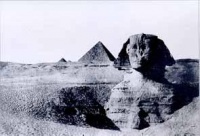Africa
From The Art and Popular Culture Encyclopedia
|
"European manufacturers dream night and day of Africa, of a lake in the Saharan desert, of a railroad to the Soudan. They anxiously follow the progress of Livingston, Stanley, Du Chaillu; they listen open-mouthed to the marvelous tales of these brave travelers. What unknown wonders are contained in the “dark continent”! Fields are sown with elephants’ teeth, rivers of cocoanut oil are dotted with gold, millions of backsides, as bare as the faces of Dufaure and Girardin, are awaiting cotton goods to teach them decency, and bottles of schnaps and bibles from which they may learn the virtues of civilization." --The Right to Be Lazy (1883) by Paul Lafargue |
|
Related e |
|
Featured: |
Africa is the world's second largest and second most-populous continent (behind Asia in both categories). At about 30.3 million km2 (11.7 million square miles) including adjacent islands, it covers 6% of Earth's total surface area and 20% of its land area. It accounts for about 16% of the world's human population. Africa, particularly central eastern Africa is the birthplace of the human race.
The continent is surrounded by the Mediterranean Sea to the north, the Isthmus of Suez and the Red Sea to the northeast, the Indian Ocean to the southeast and the Atlantic Ocean to the west. The continent includes Madagascar and various archipelagos. It contains 54 fully recognised sovereign states (countries), nine territories and two de facto independent states with limited or no recognition. The majority of the continent and its countries are in the Northern Hemisphere, with a substantial portion and number of countries in the Southern Hemisphere.
Africa's average population is the youngest amongst all the continents; the median age in 2012 was 19.7, when the worldwide median age was 30.4. Algeria is Africa's largest country by area, and Nigeria is its largest by population. Africa, particularly central Eastern Africa, is widely accepted as the place of origin of humans and the Hominidae clade (great apes), as evidenced by the discovery of the earliest hominids and their ancestors as well as later ones that have been dated to around 7 million years ago, including Sahelanthropus tchadensis, Australopithecus africanus, A. afarensis, Homo erectus, H. habilis and H. ergaster—the earliest Homo sapiens (modern human), found in Ethiopia, date to circa 200,000 years ago. Africa straddles the equator and encompasses numerous climate areas; it is the only continent to stretch from the northern temperate to southern temperate zones.
Africa hosts a large diversity of ethnicities, cultures and languages. In the late 19th century, European countries colonised almost all of Africa; most present states in Africa originated from a process of decolonisation in the 20th century. African nations cooperate through the establishment of the African Union, which is headquartered in Addis Ababa.
Contents |
Independence
By 1914, Africa had only two independent nations, Liberia, a nation founded in West Africa by free black Americans earlier in the nineteenth century, and the ancient kingdom of Ethiopia in East Africa.
Culture
The Culture of Africa encompasses and includes all cultures which were ever in the continent of Africa.
The main division is between North Africa (plus the Horn of Africa), which is part of the Islamic world, and Sub-Saharan Africa, which is in turn divided into a great number of ethnic and tribal cultures. The main ethno-linguistic divisions are Afro-Asiatic (North Africa, Chad, Horn of Africa), Niger-Congo (mostly Bantu) in most of Sub-Saharan Africa, Niger-Saharan in parts of the Sahara and the Sahel and parts of Eastern Africa, and Khoisan (indigenous minorities of Southern Africa).
The notion of a "Pan-African" culture was discussed in seriousness in the 1960s and 1970s in the context of the Négritude movement, but has fallen out of fashion in African studies. The wide distribution of Bantu peoples across Sub-Saharan Africa, encompassing parts of Western Africa, Eastern Africa, Central Africa as well as Southern Africa is a result of the Bantu expansions of the 1st millennium AD. The wide use of Swahili as a lingua franca further establishes the Bantu peoples as a nearly "Pan-African" cultural influence.
See also
- Culture by region
- Sub-Saharan Africa
- African divination
- History of Africa
- Sub-Saharan Africa
- Culture of Asia
- Culture of Europe
- Culture of North America
- Culture of Oceania
- Culture of South America
See also
- African migration
- African culture
- Black music
- African American culture
- Underground Railroad
- African diaspora
- African time
- Music of the African diaspora
- Black people
- Poverty in Africa


